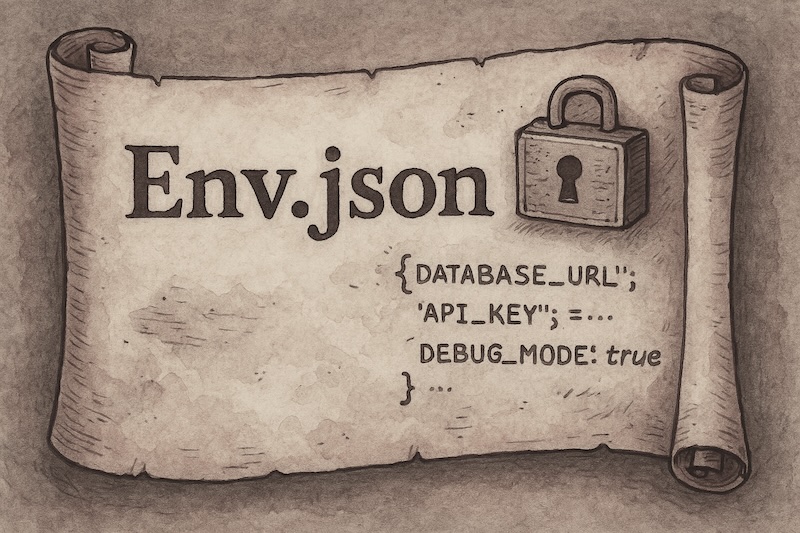Koriym.EnvJson

A modern approach to environment variables using JSON instead of .env files, with built-in validation via JSON schema.
Features
- Validated environment variables with JSON schema validation
- Better documentation through schema descriptions and constraints
- Conversion tools to migrate from
.envto JSON format - CLI utilities for shell integration and different output formats
- Fallback mechanism for development environments
Installation
composer require koriym/env-json
Basic Usage
// Load and validate environment variables
$env = (new EnvJson())->load(__DIR__);
// Access variables as object properties
echo $env->DATABASE_URL;
// Or use traditional getenv()
echo getenv('DATABASE_URL');
Configuration Files
JSON Schema (env.schema.json)
Define your environment variables with types, descriptions, and constraints:
{
"$schema": "http://json-schema.org/draft-07/schema#",
"type": "object",
"required": [
"DATABASE_URL", "API_KEY"
],
"properties": {
"DATABASE_URL": {
"description": "Connection string for the database",
"pattern": "^mysql://.*"
},
"API_KEY": {
"description": "Authentication key for external API",
"minLength": 32
},
"DEBUG_MODE": {
"description": "Enable debug output (true/false)",
"enum": ["true", "false"],
"default": "false"
},
"PORT": {
"description": "Server port number",
"pattern": "^[0-9]+$",
"default": "3000"
}
}
}
Environment File (env.json)
Your actual configuration values:
{
"$schema": "./env.schema.json",
"DATABASE_URL": "mysql://user:pass@localhost/mydb",
"API_KEY": "1234567890abcdef1234567890abcdef",
"DEBUG_MODE": "true",
"PORT": "8080"
}
⚠️ Critical: Environment Variable Type Constraints
Environment variables are always treated as strings. Using non-string types in your JSON schema will cause validation errors.
❌ These Will Cause Validation Errors
{
"DEBUG_MODE": {
"type": "boolean",
"default": false
},
"PORT": {
"type": "integer",
"default": 3000
},
"TIMEOUT": {
"type": "number",
"default": 30.5
}
}
Error message: The value will be a string (e.g., “3000”), but the schema expects an integer, causing validation to fail.
✅ Correct Approach
{
"DEBUG_MODE": {
"description": "Enable debug output (true/false)",
"enum": ["true", "false"],
"default": "false"
},
"PORT": {
"description": "Server port number",
"pattern": "^[0-9]+$",
"default": "3000"
},
"TIMEOUT": {
"description": "Timeout in seconds",
"pattern": "^[0-9]+(\\.[0-9]+)?$",
"default": "30.5"
}
}
Recommended Patterns
Boolean values:
"FEATURE_ENABLED": {
"enum": ["true", "false"],
"default": "false"
}
Numeric values:
"TIMEOUT": {
"pattern": "^[0-9]+$",
"default": "30"
}
Enum values:
"LOG_LEVEL": {
"enum": ["debug", "info", "warning", "error"],
"default": "info"
}
Workflow & Best Practices
Development Environment
- Schema creation: Define
env.schema.jsonwith all required variables, patterns, and constraints - Default values: Create
env.dist.jsonwith default/sample values that can be shared with the team - Local overrides: Create
env.jsonwith your specific local values (add to.gitignore) - Loading process:
- EnvJson first tries to validate existing environment variables
- If validation fails, it loads
env.jsonif present - If
env.jsonis not found, it falls back toenv.dist.json
Production Environment
- CI/CD setup:
- Remove
env.dist.jsonduring deployment (not needed in production) - Do not include
env.json(should be in.gitignore)
- Remove
- Configuration: Set all environment variables directly in your production environment
- Validation: EnvJson validates that all required variables are present and valid
Converting from .env
Convert your existing .env files to JSON format:
bin/ini2json .env
This generates both env.schema.json and env.dist.json files.
Command Line Tool: envjson
The envjson command line tool helps you integrate with various environments:
# Load variables into current shell
source <(bin/envjson)
# Specify custom directory
source <(bin/envjson -d ./config)
# Output in PHP-FPM format: env[FOO] = "foo1"
bin/envjson -d ./config -o fpm > .env.fpm
# Output in INI format: FOO="foo1"
bin/envjson -d ./config -o ini > env.ini
# Output in shell format: export FOO="foo1"
bin/envjson -d ./config -o shell > env.sh
Options
-d --dir=DIR Directory containing env files (default: current directory)
-f --file=FILE JSON file name to load (default: env.json)
-o --output=FMT Output format: shell, fpm, ini (default: shell)
-v --verbose Show detailed messages
-q --quiet Suppress all warning messages
-h --help Display help message
Why JSON instead of .env?
- Validation: Validate types and constraints before your application starts
- Better documentation through schema descriptions and constraints
- IDE Support: Better tooling with JSON schema validation in editors
- Constrained Data: Json Schema’s constraints for validation